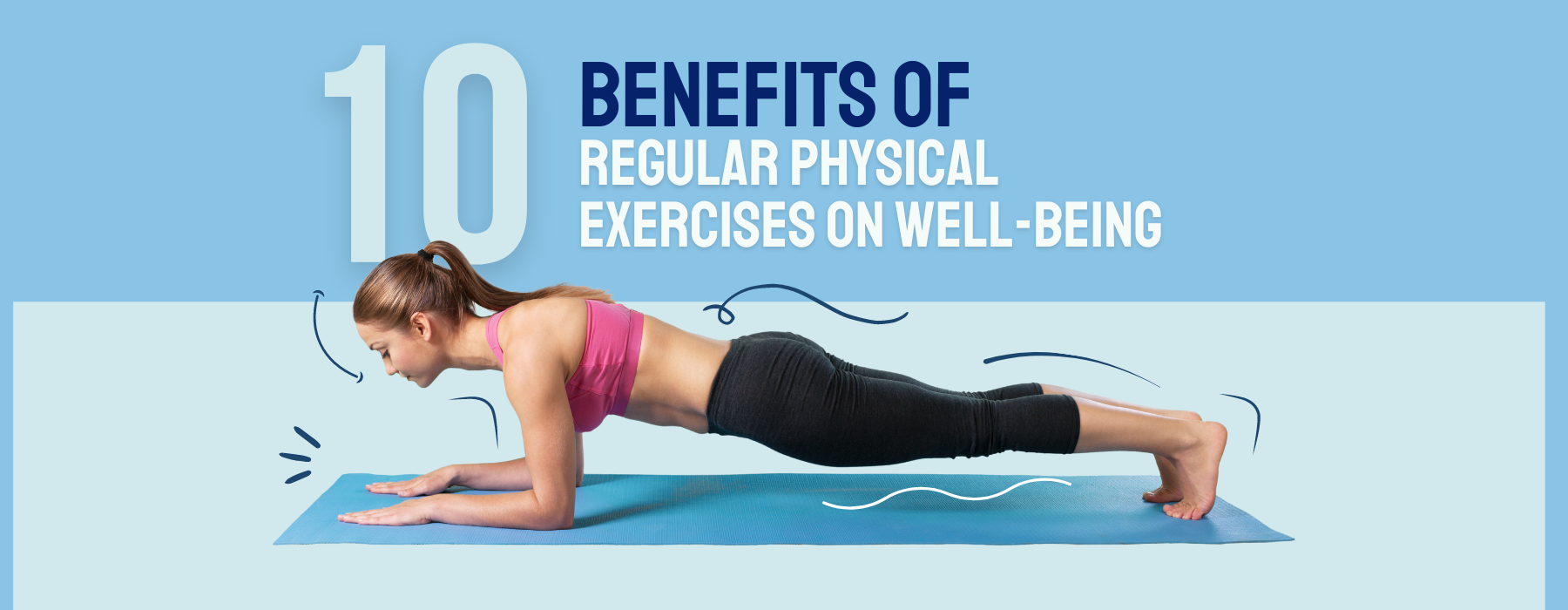

Regular physical exercises can be a foundation for a healthy lifestyle, offering a multitude of benefits that extend far beyond weight management. Engaging in physical activity can significantly improve both physical and mental health, reduce the risk of chronic diseases, and enhance overall quality of life. In this blog, we share various physical benefits of regular exercises in your daily routine, making it clear why exercise is important for everyone, regardless of age.
1. Improved Mood and Mental Health
Exercise has been shown to improve mood and decrease feelings of depression, anxiety, and stress. Physical activity stimulates the production of endorphins, which are chemicals in the brain that act as natural painkillers and mood elevators. This can help reduce feelings of depression, anxiety, and stress, making you feel happier and more relaxed.
2. Enhanced Sleep Quality
Regular physical activity can significantly improve sleep quality. The energy loss that occurs during exercise stimulates recuperative processes during sleep, helping you fall asleep faster and enjoy deeper sleep. Improved sleep quality can, in turn, enhance your mood, concentration, and overall well-being.
3. Better Brain Function and Cognitive Skills
Exercise has been shown to improve brain function and protect memory and thinking skills. Physical activity increases blood flow to the brain, which can help improve cognitive function and reduce the risk of cognitive decline as you age. This is particularly important for older adults, as it can help maintain sharp thinking, learning, and judgment skills.
4. Stronger Muscles and Bones
Regular exercise plays a vital role in building and maintaining strong muscles and bones. Weight-bearing exercises, such as walking, running, and resistance training, help increase bone density and reduce the risk of osteoporosis. Additionally, muscle-strengthening activities can help maintain muscle mass and strength, which is crucial for overall physical function and mobility.
5. Reduced Risk of Chronic Diseases
Engaging in regular physical activity can lower the risk of developing several chronic diseases. Exercise helps improve cardiovascular health by lowering blood pressure, improving cholesterol levels, and reducing the risk of heart disease and stroke. It also helps regulate blood sugar levels, reducing the risk of type 2 diabetes. Also, regular exercise can lower the risk of certain cancers, such as breast, colorectal, and lung cancer.
6. Effective Weight Management
Physical activity plays a critical role in weight management. By burning calories, exercise helps you maintain a healthy weight and prevent obesity. It also helps regulate appetite and improve metabolic health, making it easier to achieve and maintain a healthy weight.
7. Increased Energy Levels
Exercise can boost your cardiovascular system and improve lung health, which may help with energy levels. Your heart pumps more blood as you move, delivering more oxygen to your working muscles. With regular exercise, your heart becomes more efficient at this process, leading to increased energy levels and reduced fatigue.
8. Enhanced Flexibility and Mobility
Regular exercise can improve flexibility and mobility, making it easier to perform daily activities and reducing the risk of injury. Stretching exercises, yoga, and other flexibility-focused activities can help maintain joint health and improve overall physical function.
9. Reduced Risk of Falls and Injuries
For older adults, regular physical activity can reduce the risk of falls and injuries. Balance and muscle-strengthening activities help improve physical function and stability, reducing the likelihood of falls. This is particularly important for maintaining independence and quality of life in older age.
10. Longer and Better Quality of Life
Regular physical activity has been shown to extend lifespan by reducing the risk of premature death from all causes. Engaging in moderate-to-vigorous physical activity can significantly lower the risk of early death, making it a crucial component of a long and healthy life. Additionally, exercise can improve overall quality of life by enhancing physical and mental well-being.
The Final Word
The benefits of regular exercise are extensive and well-documented, as it is a powerful tool for improving overall health and well-being. By incorporating more movement into your daily routine and engaging in a variety of exercises, you can enjoy the numerous benefits that regular physical activity has to offer. Whether you are looking to improve your physical health, mental well-being, or overall quality of life, exercise is a key component of a healthy lifestyle.
To effectively support your exercise routines, consider incorporating vitamins and supplements, as this is a good way to provide the nutrients your body needs to function at its best.


Leave a Comment
You must be logged in to post a comment.